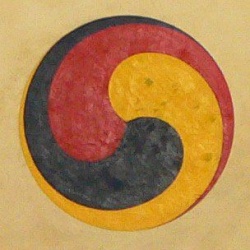Welcome to our February newsletter.
• Our first new library addition this month is a commentary on The Thirty-Seven Practices of a Bodhisattva, one of the key texts from the Kagyu or “Whispered Transmission” of Tibetan Buddhism.
Death is a continuation of birth. Death is not nothingness or a blank state; it is the time when we transfer our light to another way of being. With this understanding, we can see that it is possible to dedicate our lives toward bringing light into the world for future generations as well as for our own future.
Buddhist gankyil, ananda-chakra, or “wheel of joy”.
• In “Spirit Medicine”, a documentary by Marie Burke, we have an intimate portrait of the Cree traditional medicine as found in Canada, a way of healing fully atuned to a spirituality of nature.
We’re not doing a good job today. The Creator didn’t forget anything: we forgot to take care of ourselves. And then today, if we don’t read it in a book or in a paper, it don’t mean nothing. People don’t believe in things that are verbal… and they’re reading what other people believe.
• Finally, we present an article on the early Christian liturgical chants called the “O Antiphons”—seven brief and poignant verses associated with the Magnificat. They are sung or recited in Advent, each with a central heart-rending appeal: veni, “come”, and all together forming an acrostic of promise: ero cras, “Tomorrow, I will be there.”




